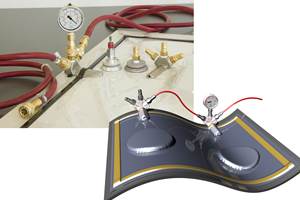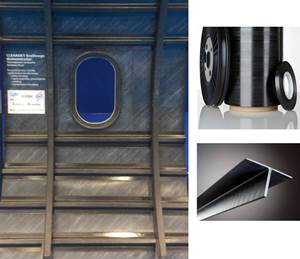Tech Table: Curing Ovens
A table of composite curing ovens composed of data provided by suppliers.
While autoclave cure is the established standard for effective consolidation and cure of composite parts and structures, especially for aerospace manufacturers, out-of-autoclave (OOA) processes have been steadily evolving and becoming more prevalent as fabricators seek ways to reduce composites manufacturing cycle time. In fact, it is possible now to achieve autoclave properties — e.g., <1% porosity — out of the autoclave. And as fabrication migrates out of the autoclave, several benefits follow: Elimination of autoclave capex investment, elimination of freezers for prepreg storage, reduced energy consumption and shorter cycle times. Ultimately, the OOA process validates the use of composites for an expanded spectrum of applications.
Within this sphere, composites curing ovens have followed OOA’s evolutionary path, with more flexible systems and more accurate, higher-end controls to further improve part quality. Composites curing ovens now possess a range of footprint dimensions, temperature ranges, heat sources, specialization, and, depending on the supplier, are completely customizable in an attempt to fit the needs of specific process requirements. This is the fourth in a series of Tech Tables that CW has published, each designed to provide as comprehensive a list as possible of suppliers, their products and selected product specifications.
This table of composites curing ovens has been built with data provided by suppliers, and is intended to provide a representation of the products they offer. While CW was unable to receive data from all composite curing oven suppliers, prominent companies unlisted — but which should be distinguished in this area — include Taricco Corp., JPW Industrial Ovens & Furnaces and ASC Process Systems.
|
Tech Table: Composite Curing Ovens |
||||||
|
Company |
Oven model |
Oven dimensions |
Heat source (electric, gas) |
Maximum temperature |
Material and process compatibility |
Additional features |
|
SW6-350-66 |
1,800 H x 1,800 W x 1,800 D |
E |
350/177 |
Wet layup, prepregs
|
Digital vacuum port manifold; batch reporting; dual-loop, non-contact IR air temperature.
|
|
|
SW6-500-66 |
1,800 H x 1,800 W x 1,800 D |
G, E |
500/260 |
|||
|
SW6-650-68 |
1,800 H x 1,800 W x 2,400 D |
G, E |
700/371 |
|||
|
SW8-500-78 |
2,400 H x 2,100 W x 2,400 D |
G, E |
700/371 |
|||
|
SW8-650-79 |
2,400 H x 2,100 W x 2,700 D |
G, E |
700/371 |
|||
|
RAD1-42 |
1,170 W x 930 D x 950 H
|
G, E |
104-649/ |
Vacuum bag
|
119-liter chamber; aluminized steel interior; 5-year heater warranty; protocol 3 controller with data logging |
|
|
RAD2-19 |
1,510 W x 1,120 D x 1,960 H
|
G, E |
104-649/ |
552-liter chamber; adjustable louvers; 5-year heater warranty; protocol 3 controller with data logging; optional vacuum ports, jacks and advanced controls |
||
|
RAD2-35 |
1,780 W x 1,240 D x 2,085 H |
G, E |
104-649/ |
552-liter chamber; adjustable louvers; 5-year heater warranty; protocol 3 controller with data logging; optional vacuum ports, jacks and advanced controls |
||
|
TAD2-52 |
2,120 W x 1,230 D x 2,410 H |
G, E |
104-649/ |
1,490-liter chamber; aluminized steel interior; protocol 3 controller with data logging;optional vacuum ports, jacks and advanced control |
||
|
TAD3-10 |
2,550 W x 1,590 D x 2,590 H |
E |
104-649/ |
1,490-liter chamber; aluminized steel interior; protocol 3 controller with data logging;optional vacuum ports, jacks and advanced control |
||
|
TAD3-21 |
3,210 W x 2,170 D x 2,590 H |
E |
104-649/ |
1,490-liter chamber; aluminized steel interior; protocol 3 controller with data logging;optional vacuum ports, jacks and advanced control |
||
|
TAD3-48 |
4,340 W x 2,380 D x 3,300 H |
E |
104-649/ |
13,450-liter chamber; adjustable louvers; unitized construction; F4T controller; optional vacuum ports, jacks and advanced control |
||
|
TAD3-96 |
4,340 W x 4,570 D x 3,300 H |
E |
104-649/ |
13,450-liter chamber; adjustable louvers; unitized construction; F4T controller; optional vacuum ports, jacks and advanced control |
||
|
WRC446-500 |
2,083 L x 2,667 W x 2,210 H |
G, E |
500/260 |
Options:
|
||
|
WRC566-500 |
2,388 L x 3,277 W x 2,210 H |
G, E |
500/260 |
|||
|
WRC787-500 |
3,124 L x 4,115 W x 2,515 H |
G, E |
500/260 |
|||
|
WRC8108-500 |
3,531 L x 4,902 W x 2,870 H |
G, E |
500/260 |
|||
|
TAH-550 |
1,803 L x 1,956 W x 2,464 H |
G, E |
500/260 |
|||
|
TBH-550 |
2,108 L x 2,261 W x 2,464 H |
G, E |
500/260 |
|||
|
SA-550 |
2,413 L x 1,168 W x 2,616 H |
G, E |
500/260 |
|||
|
SB-550 |
2,565 L x 1,168 W x 2,769 H |
G, E |
500/260 |
|||
|
EWT05ED-48-48-60 |
2,184 W x 1,524 D x 3,556 H |
E |
200-500/ |
Any composite parts. |
AMS 2750 compliant; ±10°F uniformity; multi-recipe ramp/soak programming; cascade loop control with lead-lag; 1-10°F/min ramp rates; eight vacuum ports with high-temperature quick disconnect, manual shut-off valve and pressure gauge; eight type "J" thermocouple jacks inside oven and wired to controller; one vacuum transducer located on main header and wired to controller; redundant data logging. |
|
|
EWT05ED-72-72-72 |
3,048 W x 2,134 D x 4,216 H |
E |
200-500/ |
|
||
|
EWT05ED-96-96-96 |
3,658 W x 2,743 D x 4,877 H |
E |
200-500/ |
|
||
|
EWT05ED-96-144-96 |
5,636 W x 3,962 D x 4,623 H |
E |
200-500/ |
|
||
|
EWT05ED-120-192-96 |
6,502 W x 5,182 D x 5,309 H |
E |
200-500/ |
|
||
|
SBH Series |
Min: 610 W x 610 L x 610 H ; Max: 1,219 W x 1,219 L x 1,219 H |
E |
1,000/538 |
Any prepreg in molds under vacuum; post-cure of composite materials; mandrel-wound parts. |
Vacuum systems, pumps, transducers, other accessories; WOC Premium advanced data acquisition and control system; rotators for mandrel-wound parts. |
|
|
EWN Series |
Min: 1,219 W x 1,219 L x 1,219 H; Max: 3,048 W x 4,877 L x 2,438 H |
G, E |
1,000/538 |
|
|
|
|
SWH Series |
Min: 1,219 W x 1,829 L x 1,829 H; Max: 3,048 W x 7,620 L x 2,743 H |
G, E |
1,000/538 |
|
|
|
|
UWH Series |
Min: 2,438 W x 7,315 L x 2,438 H; Max: 4,877 W x 13,716 L x 4,877 H |
G, E |
1,000/538 |
|
|
|
|
Custom Batch Ovens |
Unlimited |
G, E |
1,000/538 |
|
|
|
Related Content
SmartValves offer improvements over traditional vacuum bag ports
Developed to resolve tilting and close-off issues, SmartValves eliminate cutting through vacuum bags while offering reduced process time and maintenance.
Read MoreGKN Aerospace, Joby Aviation sign aerostructures agreement
GKN Aerospace will manufacture thermoplastic composite flight control surfaces for Joby’s all-electric, four-passenger, composites-intensive ride-sharing aircraft.
Read MoreCOMPINNOV TP2 project promotes use of thermoplastics in aerospace
Completed in 2023, COMPINNOV TP2 explored thermoplastic composites, enhancing the understanding between prepregs and production methods to foster the potential for French aerospace innovation.
Read MorePEEK vs. PEKK vs. PAEK and continuous compression molding
Suppliers of thermoplastics and carbon fiber chime in regarding PEEK vs. PEKK, and now PAEK, as well as in-situ consolidation — the supply chain for thermoplastic tape composites continues to evolve.
Read MoreRead Next
“Structured air” TPS safeguards composite structures
Powered by an 85% air/15% pure polyimide aerogel, Blueshift’s novel material system protects structures during transient thermal events from -200°C to beyond 2400°C for rockets, battery boxes and more.
Read MoreDeveloping bonded composite repair for ships, offshore units
Bureau Veritas and industry partners issue guidelines and pave the way for certification via StrengthBond Offshore project.
Read MoreAll-recycled, needle-punched nonwoven CFRP slashes carbon footprint of Formula 2 seat
Dallara and Tenowo collaborate to produce a race-ready Formula 2 seat using recycled carbon fiber, reducing CO2 emissions by 97.5% compared to virgin materials.
Read More









.jpg;maxWidth=300;quality=90)









